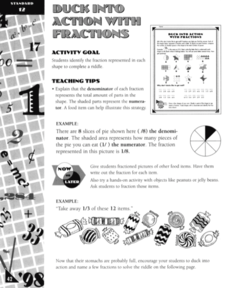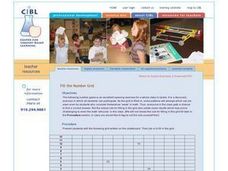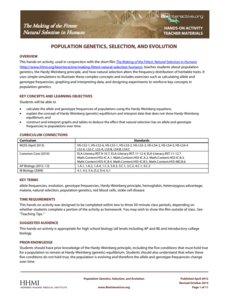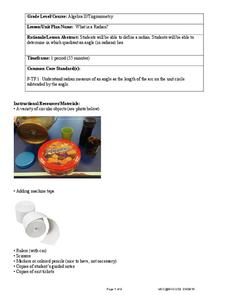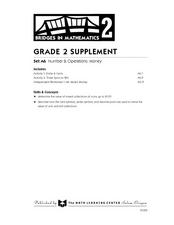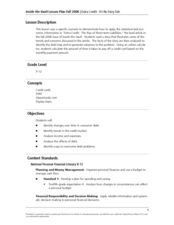Scholastic
Guess and Check
How can you find the solution to an addition or subtraction problem by guessing? Practice the guess-and-check strategy with a fun math activity based on Ms. Squid's ink mess on the homework. Kids determine which number is covered by the...
Scholastic
Duck Into Action With Fractions
Ducks hate getting mail! Find out why with a math worksheet that prompts kids to define fractions in order to solve a riddle. They view 12 fractions and align the letters to find the answer.
Curated OER
Solving Problems Involving Subtraction
Here is an excellent lesson plan on solving subtraction word problems using fractions and mixed numbers. Learners complete three activities that will help them to explore and better-understand the world of mixed numbers. Fraction bars...
Curated OER
Fill the Number Grid
Patterns emerge as the class works together to fill in a number grid. This whole group activity is designed to make all learners feel successful, and ultimately turns into a lesson on the least common multiple.
Curated OER
More Complex Fraction Problems
If your fifth graders have mastered fractions, push them to the next level! They multiply fractions by whole numbers and decimals (in the form of money math). The worksheet provides space for pupils to write out their work, based on two...
DK Publishing
Writing Equivalent Number Sentences
Connect the four operations with a series of number sentences. After studying the examples at the top of the page, third graders find ways to write related number sentences for addition, subtraction, multiplication, and division...
Inspired By Kindergarten
Numbers 1-10
Preschoolers and kindergartners can master numbers 1-10 with a set of math worksheets. Each page features one number that kids trace, represent with tally marks, and write what number they will have after adding or subtracting 1.
West Contra Costa Unified School District
Graphing Systems
Get hands on with solving systems of equations graphically. A solid lesson plan uses guided practice to show how to solve systems of linear equations. It allows time for sharing ideas and provides a printable matching activity...
Howard Hughes Medical Institute
Population Genetics, Selection, and Evolution
The Hardy-Weinberg principle states that alleles and genotypes remain constant in the absence of evolutionary influences. Scholars complete a simple hands-on activity applying the Hardy-Weinberg principle to sample data. They observe how...
Curated OER
What's the Time? #2
Challenge your class's time-telling skills with fifteen analog clocks, all with blank faces. They write the hands in the correct places, all with times to the nearest five minutes. An easy way to extend this assignment would be a group...
Curated OER
What's the Time?
Can your second graders identify the time to the nearest five minutes? Seventeen analog and digital clocks prompt learners to write the correct time. The examples demonstrate how to use common references to time, such as ten minutes to...
Houston Area Calculus Teachers
Area and Volume
An AP calculus lesson begins with an activity to determine the volume of a solid using a cross-section. Next, learners review the ways to find the area between two curves , as well how to find the volume of a solid created...
Illustrative Mathematics
Ordering Time
Practice telling time to the nearest five minutes in a digital and analog clock activity. Learners are prompted to order clock cards in increasing time order, and then write the time each clock represents.
National Math + Science Initative
Introduction to Decimals
Three activities make up an introductory instructional activity designed to create a strong foundation in comparing fractions to decimals and exploring and building decimal models. Pupils brainstorm and complete a Venn diagram to show...
California Academy of Science
How Big is Big?
In a math or life science class, "mini-me" models are created with cardstock to reflect a 1:10 scale of students' bodies. Learners measure each others' heights with meter sticks, and then reduce the size by 10. After this exercise, they...
West Contra Costa Unified School District
What Is a Radian?
Here's an algebra II activity that strives to make the concept of a radian less abstract and more conceptual. It takes a hands-on approach to exploring the idea of a radian and allows individuals to develop a definition of a...
Digital Lesson
Cereal Box Surface Area
How much math can your learners pour out of a cereal box? Your middle schoolers will explore their favorite cereal and calculate the surface area, volume, and weight ratios and log this information on the provided worksheet. They get to...
California Academy of Science
Greening Your Middle School
Middle schoolers redesign their school to make it more energy efficient, and create a model of their design. Learners get together in groups of 5, and they take on the task of making their school more energy efficient. To do this, they...
Federal Reserve Bank
Invest in Yourself
What are the different ways that people can invest in their human capital for a better future? Pupils participate in an engaging hands-on activity and analyze data regarding unemployment, the ability to obtain an education, and median...
Math Learning Center
Grade 2 Supplement Set A6 – Number and Operations: Money
Young scholars get familiar with money during this series of engaging math activities. A game has class teams accumulating money and using symbol and number cards to display their total amount correctly on a pocket chart. All the symbol...
Curated OER
Extra Credit: It’s No Fairy Tale
Students discuss their knowledge of payday loans and credit cards. In this Economics lesson, students complete a read an article and Q&A activity in groups, and play a vocabulary bingo game and a quiz game on payday loans. Students...
Institute of Electrical and Electronics Engineers
Sugar Crystal Challenge
Blow your learners' minds with a sweet lesson on nanotechnology that uses sugar to demonstrate the difference nanoscale surface area makes in dissolving and crystal formation. Plenty of supportive background information is read to...
Mathematics Assessment Project
Representing 3-D Objects in 2-D
How does the shape of the surface of water in a container change as water leaks out? After tackling this question, learners take part in a similar activity with more complex figures.
Mathematics Vision Project
Quadratic Equations
Through a variety of physical and theoretical situations, learners are led through the development of some of the deepest concepts in high school mathematics. Complex numbers, the fundamental theorem of algebra and rational exponents...



